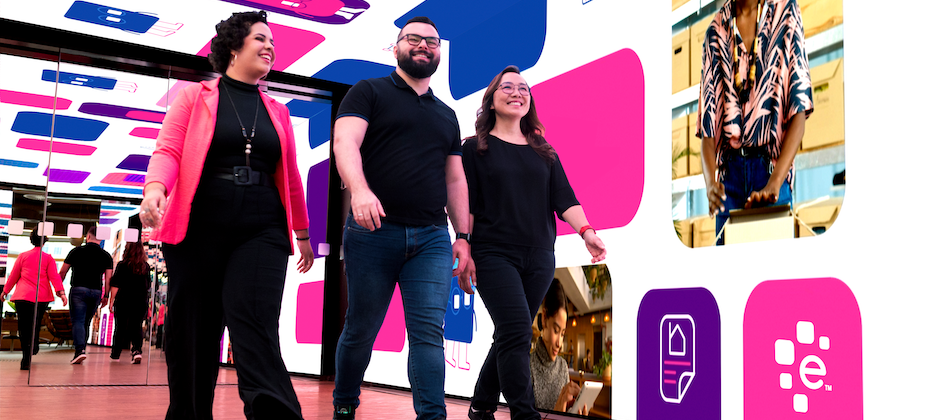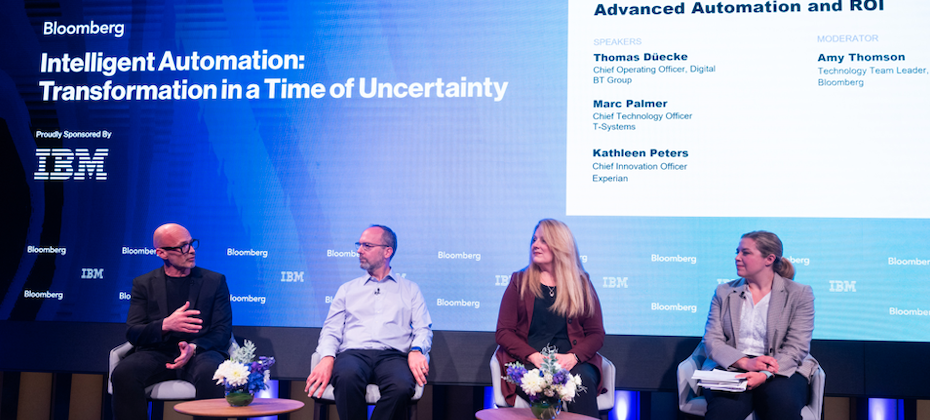Innovation
At Experian, we are continually innovating and using technology to find solutions to global issues, modernize the financial services industry and increase financial access for all. Read about our latest innovation news below:

In its 11th year, Experian's Data Breach Resolution group today released its annual Data Breach Industry Forecast for 2024. The report’s global outlook identifies potential moves cybercriminals near and far may take to penetrate organizations and cause chaos. The six predictions included offer commentary into the evolving landscape including the vulnerabilities in expansive data supply chains, what may be new targets, and the sophistication of cyber crews globally. A key reminder is that cybercriminals are working smarter not harder. Like many, they too are potentially leveraging modern tools like artificial intelligence. There may be sophisticated cybergangs operating like organized crime families. Also, hackers today could be backed by growing resources from nation-state sponsors. Their MO is not only stealing data to possibly sell on the dark web or deploy ransomware anymore. They can potentially reap benefits by disrupting economies or industries as we mention in our prediction, “No, not Mother Earth!” or use intellectual property as collateral or for personal gain outlined in the “Winning from the Inside” prediction, for example. There are always new ways of conducting “business” for cybercriminals. In the face of emerging cyber threats, organizations are urged to prioritize cybersecurity as a fundamental aspect of their operations. They should regularly update and reinforce security protocols, conduct thorough risk assessments, and invest in cutting-edge cybersecurity technologies. By staying vigilant and adopting a proactive cybersecurity stance, organizations can significantly mitigate the risks posed by the evolving tactics of cybercriminals in 2024 and beyond. Experian Global Data Breach Resolution offers international resources for companies impacted by a security incident and services include IdentityWorks℠ Global, multilingual call centers, and notifications covering more than 100 countries. Experian has also recently expanded capabilities to Japan, Taiwan and Thailand. To access the complimentary report, visit https://ex.pn/2024databreachindustryforecast.

In the chronicles of business evolution, one often recalls Amazon's humble beginnings as an online book seller before transforming into the e-commerce giant we know today. Reminiscent of that journey, Experian has undergone its own transformation. It has long since ceased to be simply a “credit bureau” and has instead embraced a story that is far more dynamic and which defies this caricature. The Real Experian: When people associate Experian with being a credit bureau, our response is a resounding, “Yes, but that is only a part of our story." It is the beginning chapter—as data evolved to ‘Big Data’, we layered in technology to understand that data, catapulting our company into a different realm. Today, Experian is a global force with a presence in over 30 countries, boasting a team of 22,000 professionals dedicated to harnessing the power of data and analytics for the betterment of businesses, societies, and consumers worldwide. Embracing Data and Analytics: At the core of our story lies a commitment to embrace data and analytics in a way that only Experian can. We collaborate across our operations to deploy advanced technologies, artificial intelligence, and to tap into rich data. The result? A powerful impact on businesses, societies, and consumers alike. Only Experian can: We are proud to share our story of how we power opportunities in a way that only Experian can. Experian leaders worldwide provide a glimpse into what sets Experian apart in the modern landscape of advanced technologies and powerful analytics. You can read the 5-minute story here. Continual Evolution: Experian's evolution from the world's leading credit bureau to a global data and analytics powerhouse is an ongoing journey. Our vision propels us forward, driving us to continually redefine our role in an ever-changing landscape. As Experian continues to evolve, our commitment to making a powerful difference remains unwavering. Our story is one of transformation, innovation, and a relentless pursuit of excellence. Join us on this journey, as we redefine what it means to be a global leader in data and analytics.

By the time Vikki Nunnery decided to join the U.S. Army, she was almost finished with her nursing degree. It was her senior year, on the cusp of achieving her Bachelor of Science. A professor piqued her interest in the military. “One of my instructors was an LPN. She deployed and did a presentation about being a nurse in the army. I came in (to the Army) as a registered nurse (RN) and am now a nurse practitioner,” Nunnery said. Now Lieutenant Colonel Nunnery, DNP, is married to a fellow military member, has two children and has been on active duty for 17 years. Between student loans and credit cards, she also accumulated a lot of debt. “We never talked about (money) at home. My family never talked about managing money,” Nunnery said. “Being married with kids, I’m trying to be more financially responsible for the future.” Experian and Operation HOPE are helping Nunnery do just that. She is a client of the expansion of its partnership, which offers new, no-cost dedicated resources specifically for active duty members, veterans and military families across the country. The program provides financial coaching and wellness, credit education and financial disaster preparedness. The unique circumstances of the military community impact their finances more than the general population. A survey shows servicemembers and their spouses have more difficulty paying some monthly bills and finding economic assistance because of overseas deployments and frequent moves, combined with rising inflation. “(This work) is personal. I’ve been working around military communities for over 10 years. I know the challenges,” said Jessica Hamel, financial wellbeing coach for Operation HOPE Inside Experian program. Hamel is a Gold Star sister and military spouse. Her husband’s divorce and her brother’s passing had negative financial impacts on their respective families. “Often with some of our younger soldiers, younger service members, they haven’t had life experience in terms of needing to budget. We have members of the military right now right out of high school and there’s not a lot of experience managing their own money. They’re quickly thrust into a place where they don’t have a support system to do that,” Hamel said. “What we see at some major bases is a lot of predatory financial institutions – payday lenders, title max loans, pawn shops, buy-here-pay-here dealerships.” "We have members of the military right now right out of high school and there’s not a lot of experience managing their own money. They’re quickly thrust into a place where they don’t have a support system to do that." Without a foundation of money management know-how, as service members move up in rank and earn more money, their habits can follow. Hamel stressed the importance of helping clients establish a foundation of knowledge and provide tools to help them address specific financial situations and their future. “Clients know they need to do something different than the way they grew up, but perhaps they grew up in generational poverty and they’re using the military to secure a job immediately, get job experience or support. They can make a great living in the military,” she said. “They don’t know what they don’t know, but they know they don’t have all the right information.” With Hamel’s guidance, Nunnery has set up a budget and developed habits that have led to increased savings, saving for a house, and a bump in credit scores. Hamel is also exploring whether Nunnery qualifies for public school loan forgiveness. The couple is planning to pass on these lessons to their kids, starting with opening their own checking accounts, and teaching them how to save, budget, and the importance of credit scores. “Without Jessica, we’d still be living paycheck to paycheck. I wasn’t paying attention to my accounts. I was just spending and spending,” Nunnery said. “Little things like a budget, where our money is going - she really helps us focus on these things. That’s really good support.” “We have so many people who haven’t learned about credit and then get blamed for a game they never got the rules to,” Hamel said. “I’m honored to be the coach for this program.” For more information about financial coaching and resources for servicemembers, military family or veterans, contact Jessica Hamel at Jessica.hamel@operationhope.org.

Early in my career, I gained a lot of knowledge about credit. But when I moved to the United States from Brazil, establishing credit was a challenge. I worked part-time in a credit card company call center during college. I come from a humble family, and through helping customers, I learned the ins and outs about credit and money management. But all the solid credit history I built up in my home country didn’t transfer to the U.S. When I immigrated, I had to pay upfront for everything from utilities to a cellphone and it made me feel at a disadvantage. Thanks to Experian Boost®i, our feature that allows you to build credit without debt, and responsible management of debt, my FICO® Scoreii quickly rose to reflect my true creditworthiness. But I’ll never forget how it felt to be invisible when it came to the credit system. Being seen is the first step to equitable access to financial tools. Now that Experian conveniently offers Experian credit reports in Spanish onlineiii, consumers who prefer to access information in Spanish will be able to directly comprehend their credit profile so they can feel empowered. Understanding your credit report is a critical component for your ability to make informed decisions about your finances. As the executive sponsor of our Juntos Employee Resource Group (ERG) and someone who was new to credit in the U.S., I know first-hand that being seen is the first step in a journey towards financial wellness. To help you be informed, Experian also has a Spanish-language credit e-book and articles at the Ask Experian blog. Learn more about my financial health journey and my colleague's through #ExperianStories. i Results will vary. Not all payments are boost-eligible. Some users may not receive an improved score or approval odds. Not all lenders use Experian credit files, and not all lenders use scores impacted by Experian Boost®. Learn more. ii Credit score calculated based on FICO® Score 8 model. Your lender or insurer may use a different FICO® Score than FICO® Score 8, or another type of credit score altogether. Learn more. iii Only Experian credit reports are available in Spanish. All other services associated with an Experian membership are available in English only. English fluency is required for full access to Experian’s products.

Generative A.I. is rapidly transforming every industry as we know it and introduces a whole new world of opportunity and risk. At Experian, we already have many years of experience in machine learning, neural network embedding and artificial intelligence. Because of this, we’re established as a trusted leader in the space and are uniquely positioned to champion the ethical, responsible and compliant use of generative A.I. We manage the risk while advancing the opportunity. This was one of the key themes emerging from a recent panel discussion for Bloomberg’s Intelligent Automation Event in London that I participated in with Thomas Duecke, COO, Digital at BT Group, Marc Palmer, CTO at T-Systems and Amy Thomson, Bloomberg’s EMEA Technology Team Leader. At Experian, we support the responsible use of generative A.I. to accelerate new product offerings, drive operational productivity, increase financial inclusion, and foster an adaptive approach to using the technology. I’m personally very passionate about this as my team is dedicated to creating innovative solutions that enable clients to better automate processes across a variety of use cases including fraud prevention, lending and process optimization. We’re always looking for new data-driven solutions that can create meaningful change for consumers around the world. That’s why our teams are focused on advancements through generative A.I. and identifying use cases across many aspects of our internal operations as well as within our customer-facing portfolio of products and services. We’re encouraged by the opportunities generative A.I. can facilitate when it comes to productivity. It can allow us to automate processes that are mundane or labor-intensive and enable employees to focus more of their time and energy on creative decision making, problem solving, and more effective collaboration. We’ll continue to leverage our expertise and knowledge in broader intelligence fields to uncover the opportunities this next chapter will provide for our business, clients and consumers. Bloomberg Intelligent Automation

You may have recently read that Experian®, alongside the other two credit bureaus, permanently extended free weekly access to consumer credit reports through AnnualCreditReport.com. While I believe the move helps consumers more regularly review their credit reports, it only begins to scratch the surface of how we empower consumers to take control of their financial lives. People come to Experian looking for ways to improve their financial health. We have direct relationships with millions of consumers and listen to their wants and needs. That’s why we’ve transformed ourselves into the one stop shop for our members to address many facets of their financial journey. Whether it’s accessing credit education materials, monitoring their credit files, finding ways to save money or improving their credit history, consumers can come to Experian to find the tools and resources they need. Building creditFor instance, in 2019, we launched Experian Boost® --a first-of-its-kind feature that allows consumers to contribute positive payment information for eligible bills including utilities, telecom and even video streaming services, directly into their Experian credit file. Consumers can now also add positive residential rent payments through Experian Boost®1. More recently, we debuted Experian Go™—another first-of-its-kind feature designed to help “credit invisibles,” or people with no credit history, begin building credit. Credit invisibles who utilize the feature together with Experian Boost can establish an authenticated Experian credit report, tradelines and a credit history and, as a result, get access to financial offers. Staying on top of your informationBeyond our credit building offerings, we’ve long provided consumers the opportunity to access their Experian credit report and FICO® Score2, free-of-charge. By providing consumers access to their credit report and FICO® Score, we’re enabling them to better understand how they may look to lenders, identify potential fraud, determine the specific factors that are affecting their credit and how to improve it. In addition, our credit and dark web monitoring services help consumers detect whether their personal information is potentially available to fraudsters and protect against identity theft. Putting money back into your walletWe also recognize the value of saving money. As part of an Experian membership, we offer resources that can potentially help consumers save on the cost of their auto insurance and find the best credit card for their financial needs. We empower consumers to: Compare auto insurance policies. Consumers can comparison shop to potentially find a better rate on their current policy and save. The free Experian service delivers multiple, tailored rates from up to 40 leading and well-established auto insurance carriers, allowing consumers to quickly find and purchase an auto insurance coverage plan that meets their needs. Find the right credit card. Our free Marketplace makes it easy for consumers to compare different credit card options. We match consumers’ financial information against lender’s requirements to match them with the tailored offers. Every consumer deserves the opportunity to live their best financial life. Providing free resources to help consumers effectively navigate their financial journey is the best way to help them realize financial independence. While I’m proud of how we’ve helped consumers thus far, we will continue to innovate and offer consumers the tools to improve their financial wellbeing. [1] Results will vary. Not all payments are boost-eligible. Some users may not receive an improved score or approval odds. Not all lenders use Experian credit files, and not all lenders use scores impacted by Experian Boost®. Learn more. [2] Credit score calculated based on FICO® Score 8 model. Your lender or insurer may use a different FICO® Score than FICO® Score 8, or another type of credit score altogether. Learn more. [3] Results may vary and some may not see savings.

Our latest State of the Automotive Finance Report: Q1 2023 showed the average new vehicle loan amount reached $40,851, and today’s average used vehicle loan amount is $26,420. While the growth of average loan amounts is slowing, and in some cases, decreasing from previous years, rising interest rates are pushing monthly payments higher for many consumers. This news comes at a time when many consumers are looking for ways to save money and are holding onto their vehicles longer. In fact, as of Q1 2023, the average length of ownership for new vehicles purchased as far back as 2010 is 4.19 years. At the same time, the cost of vehicle repairs has many consumers feeling financially stressed. Whether to eliminate the burden of rising costs of goods and services, or to plan for big ticket items like vehicle purchases or repairs, our research shows saving money is top of mind for many consumers. Two-thirds tell us they are actively looking for ways to trim expenses from their monthly budget. If you’re shopping for a new set of wheels, or trying to keep your old ones on the road longer, here are four steps you can take to save money: Use credit as a financial tool A good credit score could help you qualify for better interest rates and better terms for loans. Whether you’re looking to purchase a new vehicle or finance repairs, a positive credit history can be a powerful financial tool. Your credit score can also impact the rates you may pay for insurance. Work to keep your credit card balances low and make your payments on time. Using tools like Experian Boost[1] allows you to add your positive payments for telecom and utility bills as well as video streaming services - and now rent payments – to your Experian credit file to potentially increase your FICO®[2] Score instantly. Cut costs where you can We are committed to helping consumers save money in multiple ways and auto insurance is one area consumers may be overpaying. To combat this, we now offer an auto insurance shopping service that delivers tailored rates based on your current policy and vehicle directly from our mobile app. Consumers can potentially save on average more than $900 per year through our service, which is significant. Plan ahead to save on interest rates Interest rates are a key consideration if you’re shopping for a new or used vehicle. Our latest State of the Automotive Finance Market Report showed the average interest rate for a new vehicle is 6.58%. Oftentimes when shopping for a vehicle the main priority is securing a low monthly payment, but it’s also important to assess the total cost of the loan, particularly amid rising interest rates and vehicle prices. With this in mind, some new vehicle shoppers who were in search of lower interest rates opted for shorter loan terms in Q1 2023. Determine how much you can afford to spend each month and opt for shorter loan terms to save on interest. Don’t get a lemon With prices increasing, we know many people are opting for used vehicles. While this can help with costs, it’s important to know what you’re buying before you sign on the dotted line. Request a vehicle history report, like an Experian AutoCheck report, before committing to the purchase. These reports include how many previous owners the vehicle had, or if there were any reported accidents. This can help you avoid surprises down the road and give you a better idea of the value of the car. In addition to a vehicle history report, we recommend having the vehicle inspected by a licensed mechanic. We rely on our vehicles every day. By leveraging the right tools, and with proper planning, you may view them less as a financial burden and more as a means to enjoy the freedom of the open road. [1] [Results will vary. Not all payments are boost-eligible. Some users may not receive an improved score or approval odds. Not all lenders use Experian credit files, and not all lenders use scores impacted by Experian Boost. Learn more. [2] FICO is a registered trademark of Fair Isaac Corporation

Understanding how credit works is key to protecting your financial health in any environment – and this is especially true today. What’s new: To see how America’s youngest consumers are faring, we recently deployed a national survey looking at: Gen Z and millennial’s understanding of credit and personal financeHow recent economic news is impacting their financial health What would make them feel more optimistic about their situation Why it matters: As we look ahead, millennials and Gen Z consumers will be the biggest drivers of spending and our economy. Ensuring they have access to trusted financial education and resources is key. Survey highlights include: Building a strong credit history is key to unlocking many things we want in life, yet many younger people do not understand its importance until they get older. The bottom line: Our research revealed many Gen Z and millennial consumers are simply unsure how to successfully build credit and are hungry for trusted resources of personal finance information. “We believe in financial power for all and ensuring America’s youngest consumers are empowered to be financially independent adults is key to achieving this,” said Christina Roman, consumer education advocate at Experian. “Personal finance and credit education are central to our mission. We are committed to being a trusted resource for consumers looking to improve their financial health during our current economic environment and beyond.” How Experian Can HelpThere are free and easy steps consumers can take to help improve their financial health with Experian, including: Getting a free copy of your Experian credit report and FICO[1] Score®[2] at www.experian.com or via Experian’s mobile app. Our app also has free personal finance and credit building tools Add positive telecom, utility, video streaming service and qualifying rent payments to your Experian credit report through Experian Boost[3] for an opportunity to improve your credit scores by visiting www.experian.com/boost. Young consumers without an established credit history can download Experian’s mobile app and enroll in a free Experian membership to establish, use and grow credit responsibly with Experian Go™ Joining Experian’s #CreditChat hosted by @Experian on Twitter with financial experts every Wednesday at 3 p.m. Eastern timeVisiting the Ask Experian blog for answers to common questions, advice and education about creditLearn how to build and protect your credit with Experian’s Credit Essentials for Everyone flipbook and find additional credit education resources at resources at http://www.experian.com/consumereducation. Find additional money-saving resources from Experian by visiting experian.com/savings Survey MethodologyExperian commissioned Atomik Research to conduct an online survey of 2,008 adults between the ages of 18-42 years old throughout the United States, with even distribution between Generation Z (N=1,005) and millennials (N=1,003) participants. The margin of error is +/- 2 percentage points with a confidence level of 95 percent. Fieldwork took place between March 31, 2023, and April 4, 2023. Atomik Research is an independent, creative market research agency. [1] FICO is a registered trademark of Fair Isaac Corporation [2] Credit score calculated based on FICO Score 8 model. Your lender or insurer may use a different FICO® Score than FICO® Score 8, or another type of credit score altogether. Learn more. [3] Results will vary. Not all payments are boost-eligible. Some users may not receive an improved score or approval odds. Not all lenders use Experian credit files, and not all lenders use scores impacted by Experian Boost. Learn more.

I don’t know about you, but the importance of a good credit score wasn’t something talked about around my family’s dining room table growing up. I knew the value of a dollar and the importance of saving and budgeting, but I didn’t realize how many things I’d want in life would depend on having an established credit history. It wasn’t until I went buy my first car that I realized just how important credit can be. I had been using credit, but I wasn’t using it as a tool that could work for me. In fact, in this instance, my credit score was working against me. Thankfully, my boyfriend at the time (and now husband), co-signed on my auto loan so I could get a better interest rate. This experience served as the wakeup call I needed to prioritize improving my credit and overall financial health. I know my story is similar to many others. In fact, our recent research shows 77% of millennials and Gen Z consumers are striving to be more financially literate and nearly 80% are actively trying to increase their credit scores. Just as I was, these consumers are hungry for knowledge and 69% are actively seeking trusted resources for personal finance information. I’m thankful to work for a company that puts consumers at the heart of everything we do. Education is central to our mission and my job is to educate consumers about the tools and resources we have available to help bring financial to all. Talk about coming full circle! So, if you’re looking for ways to improve your financial health, here are a few quick tips: Get engaged: Many people think checking their credit report will hurt their credit scores, but this is not true. This is one of the most common myths about credit reports. You can, and should, check your credit report regularly. This is one of the best ways to understand where you stand from a credit perspective. You can get a free Experian credit report and FICO® Score once a month through our mobile app. You can also get a free credit report from each of the three credit reporting agencies by visiting AnnualCreditReport.com. Usethe tools available to you: There are a lot of helpful tools availabletoday that weren’t even just a few years ago, including Experian Boostand Experian Go. Experian Go makes it easyfor people with a limited or nonexistent credit history to establish, use andgrow credit responsibly. And with Experian Boost, you can self-report your cellphone, utility, telecom, and video streaming service payments directly to yourExperian credit report for an opportunity to instantly improve your creditscore. Seektrusted resources: In this age of information overload andsocial media, it can be hard to find trusted sources of personal finance information,but we’re here to help. You can find answers to common questions by joining ourweekly #CreditChats onTwitter or by visiting our Ask Experian blog.We also have free resources available at www.experian.com/consumerseducation. Avoidmaking mistakes with lasting financial impact: I know, I know. This canbe easier said than done, but it’s an important consideration to protect yourfinancial health. There are many times in life where it’s OK to learn by makingmistakes, but credit and personal finance are not a time you want to do that ifyou can avoid it. If you’re using credit, make sure you have a plan for payingthe debt you owe. Credit can be a financial tool, but debt is a financialproblem. Make sure you understand your needs vs. your wants and try to keep yourbalances as low as possible. As the saying goes, knowledge truly is power. I know this to be true from experience and our research shows a better understanding of personal finance would make 75% of Gen Z and millennials feel more optimistic about their situation. This is good news as there are many easy steps consumers can take today to feel more educated and empowered. Getting engaged with your credit report and finding the right tools and resources are some of the best ways to protect your financial health in our current environment and beyond.